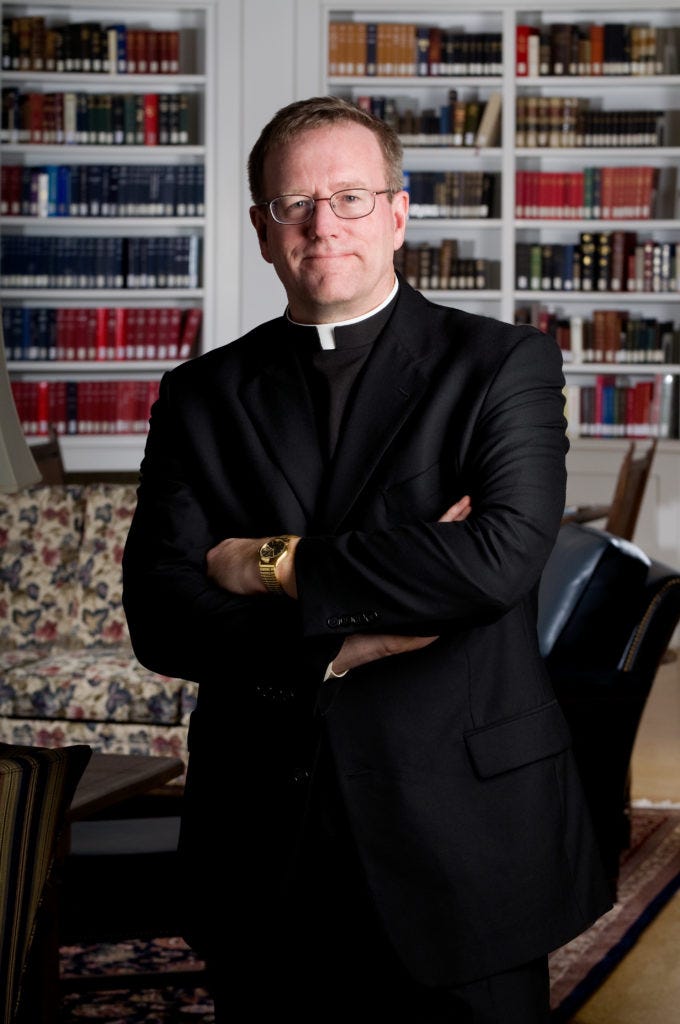Matthew Levering, The Theology of Robert Barron (Elk Grove Village, IL: Word on Fire Academic, 2023), vii-334. $34.95.
Bishop Robert Barron has seen his fair share of controversy from both the left and the right wings of the Church. Yet, according to Levering, Barron is neither a liberal nor a traditionalist; he is post-liberal (8-9). One plausible way to read Levering’s work is an apologetic for Barron’ theology and his approach to ministry. But it clearly isn’t just an apologetic. Levering’s work indirectly makes a proposal for the Church. As the Church is facing an uncertain future, Levering, whether intentional or not, puts forward Barron’s approach to theology as a way forward. That is, the Church shouldn’t become more liberal in its approach to doctrine, nor should the Church retreat to the thirteenth century. Rather, the Church should approach its mission in a similar way as Barron approaches his own.
Levering’s volume is unique in that, each chapter, before developing Barron’s own theology, engages with at least one influential writer or theologian. That is, each chapter gives a primer on thinkers such as, Raymond Brown, John Meier, Stanley Hauerwas, Alasdair MacIntyre, Edward Schillebeeckx, and Richard Rohr. Those not familiar with the aforementioned theologians (among others), will come away with a better grasp for not only Barron’s theology, but these theologians as well.
Juxtaposing Barron with these thinkers allows the reader to see the brilliance of Barron’s theology. Barron’s theology takes truths articulated by these thinkers and advances them, often times, in a more orthodox way. For example, Barron agrees with Rohr with respect to the need to address the human ego as an obstacle to true human liberation. However, Barron doesn’t commit the same unorthodox mistakes that Rohr plausibly makes. Similarly, Barron thinks we can learn from Brown with respect to the historical critical method. Nonetheless, while there is a place for the method, we shouldn’t use it as the only hermeneutic that can lead us to truth. In fact, Barron thinks the Church’s primary hermeneutic should be defined Christocentrically. She shouldn’t handicap herself to the historical critical method as if she didn’t have the resources of faith (135). Inspired by Wittgenstein, Barron takes MacIntrye’s tradition-based perspectivalism, and, develops his own evangelistic strategy after it (179-186). Levering shows that Barron takes ideas from other thinkers and adds his own orthodox flair to them, or at least, situates the idea in a suitable Catholic context.
There are some areas I wish Levering would have discussed that don’t get addressed. In an interview by the conservative pundit, Ben Shapiro, Barron hints at a more optimistic Christology of other religions. Does Barron have a more optimistic theology of other religious traditions?[1] One might think Barron would be inclined to a more optimistic theology of other religions given his defense of there being a Balthsarian-rational hope that all might be saved (287). But one shouldn’t be too quick to presumption. You can think that God hasn’t been involved in the revelation of other traditions, but, nonetheless, still think that many or most will be saved.
Another important area that Levering could have more fully developed relates to Barron’s Old Testament hermeneutic. Barron famously emphasizes an allegorical interpretation to the ‘dark passages’ in Old Testament (e.g., the call to kill the Canaanites). Does Barron see the allegorical reading as the literal reading of these passages, or, is there some additional literal meaning? In other words, should we see Barron as being in the same camp with someone like Matthew Ramage?[2] Or do we take Barron to endorse that God historically, commanded the Israelites to wipe out innocent women and children, as some more traditionally inclined persons do? Of course, the volume is already over 300 pages and Levering only has so much space to work with.
I imagine some readers will be upset that Levering doesn’t turn Barron into a warrior for a wing of the Church. For example, Levering bypasses Barron’s take on everyone’s favorite footnote in Amoris Laetitia. Similarly, I imagine that some might wonder why there isn’t more discussion on Barron’s theology of human life and marriage. But I think not making a big deal out of these issues is intentional. As mentioned at the start of the review, I take it that Levering is putting Barron forward as a path the Church can take. Since Barron has had discussions with American right wing political thinkers, Barron oftentimes gets accused of being on the side of the right. But Barron isn’t a ‘right-wing’ bishop. He is a Bishop who represents the Catholicity of the Church. While clearly orthodox, he at times pushes traditionalists in unformattable ways as well. This perhaps is most clearly seen when Barron supported a book written by Fr. Martin.[3] Similar to Pope Francis, Barron makes ideologues on both sides feel uncomfortable at times. Nonetheless, what Levering makes clear is that Bishop Barron’s theology can be considered as mainstream in Catholic circles. Barron’s theology, while evangelical, is very much rooted in the Church’s post-Vatican Two consensus. Levering I take it then, has done the Church a great service in making this clear.
[1] For a more optimistic theology of other religions, see Gerald O’Collins, A Christology of Religions ( ) and Tyler Dalton McNabb and Erik Baldwin, Classical Theism and Buddhism (London: Bloomsbury Academic Press, 2022).
[2] See Matthew Ramage, Dark Passages of the Bible (Washington DC: Catholic University of America Press, 2013).
[3] See for example, ‘LA’s Bishop Barron Attacked for Fr James Martin Support,’ Catholic California Daily, https://www.cal-catholic.com/l-a-s-bishop-barron-attacked-for-father-james-martin-support/.





Barron's an antisemite. Told Ben Shapiro he didn't need to convert, fullness of truth, blah blah.